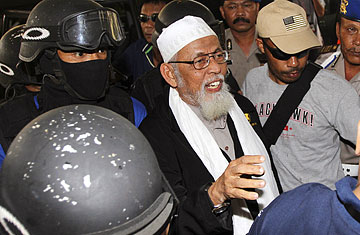
Abubakar Ba'asyir is escorted by antiterrorism police as he arrives at police headquarters in Jakarta, Indonesia, on Aug. 9, 2010
Monday's arrest of militant cleric Abubakar Ba'asyir marks another step forward in Indonesia's mission to disrupt homegrown terrorist networks and comes just days after President Susilo Bambang Yudhoyono spoke of a possible threat on his own life. The police arrested Ba'asyir in Banjar, west Java, on charges that the 72-year-old was involved in planning and funding a terrorist training camp in Aceh that was uncovered by police in February.
Over the weekend, police arrested five men who had trained in the Aceh camp and were suspected of plotting a large-scale attack, possibly on the country's independence day, on Aug. 17. Police spokesman Edward Aritonang said a bombmaking facility and materials were found along with a vehicle, registered to a French national, that could have been intended for use as a car bomb. "We are still looking for the person who bought the car and gave it to the group," Aritonang told reporters at a press conference in Jakarta.
Although the police would not name the President as the target of the suspected plot, they have said terrorist groups were shifting their attention from soft targets like hotels to those considered to be thogut, or symbols of what the militants believe go against Islam, like the head of a secular government. "From the beginning, he has been one of their targets," said Aritonang. The President has made similar claims since taking office in 2004, and repeated his concern again over the weekend, just before the Aceh arrests. "I received a report last night from my security team that there are those among us who have bad intentions," Yudhoyono told reporters in Ciwidey, another small town in west Java, on Aug. 7.
Ba'asyir has been advocating for an Islamic state for decades. He was jailed in 2004 on charges of conspiracy in connection with the deadly Bali bombings in 2002. Since being released in 2006, Ba'asyir has continued speaking at mosques around the country and formed the Jemaah Ansharut Tauhid, an aboveground organization whose goal is to advocate for Shari'a law in Indonesia. Experts say the elderly cleric has been in the police's crosshairs for months and that, if he is found guilty, the charges could keep him in prison for the rest of his natural life. "The police are pretty confident they have him this time, but one can never be 100% sure," says Sidney Jones, a terrorism expert with the International Crisis Group. "I'm pretty sure they can convict and would not have moved on him again if they couldn't."
While the public and media generally praise the work of Detachment 88, the police's crack antiterrorism unit, some analysts continue to question the general tolerance of other hard-line groups that are not associated with Ba'asyir, like the Islamic Defenders Front, or FPI, and their splinter groups, which are accused of attacking minorities. Muslim vigilantes continue to act with near impunity against Christians and Muslim minorities. Christian parishioners were attacked in the town of Bekasi, outside Jakarta, on Aug. 8, and hundreds of members of the Ahmadiyah sect, who consider themselves Muslim but do not believe Muhammad was the last prophet, have been attacked over the years. "When the President talks about a threat that he thinks is real, either toward himself or the country, the police move quickly," complains Hendardi, director of the Setara Institute. "But when he stays silent on other issues like what is happening to certain minorities like the Ahmadiyah and others who have been attacked in Bekasi, the police tend to hesitate."
Legislators in the opposition have cited the thuglike behavior of radical groups taking the law into their own hands as a form of terrorism that needs to be taken more seriously. "The people in power are just letting it happen," says Rieke Diah Pitaloka, a legislator from the Indonesian Democratic Party of Struggle who has confronted the groups in the past. The presidential spokesman, however, recently dismissed claims that the President was ignoring the rights of minorities or allowing certain groups to take the law into its own hands. "The President feels like he doesn't have to comment on everything that happens in the country," Dino Patti Djalal told foreign reporters in July. "He wants his ministers to do some of the job." Indonesia may be safer with one more extremist like Ba'asyir behind bars, but for some, the terrorism will continue until more people speak out.
